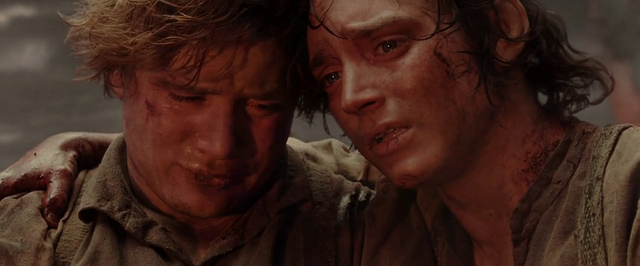The Price Of Sacrifice
Sacrifice is a key theme in stories.
I was reminded of this during this past weekend, when my family was watching Lord of the Rings. It’s been quite a while since I’ve seen the movies, and as I watched the familiar scenes at the end of the first movie, a realization struck me.
The idea of sacrifice abounds.
Perhaps the time between viewings made this reality stand out to me in more clarity, or perhaps my mind chose that particular time to be engaged in the story. Either way, the realization came, stronger than it ever had before, either watching the movies or reading the book.
Even though the context for my revelation were the scenes surrounding the breaking of the Fellowship, the more I thought about it, the more I realized the integral nature of sacrifice is woven throughout the entire story.
- Frodo sacrificed his comfort in order to bear the Ring
- Gandalf sacrificed his life to protect the Fellowship
- Sam sacrificed his own desires in favor of accompanying Frodo into the bleak waste of Mordor
- Aragorn sacrificed his desire to take the Ring, instead allowing Frodo to leave
The list goes on, and it’s not only in Lord of the Rings that we find sacrifice acting as a pillar supporting the story. Another example that comes to mind is Hunger Games.
The oppressive setting of Panem, the tyranny of the Capitol, and the brutal nature of the Games demanded sacrifice. The entire rebellion could be considered one giant sacrifice on the part of those who fought in order to obtain freedom.
Why does sacrifice show up time and again in stories? What can we learn about sacrifice from those examples?
Sacrifice Is Painful
Pain can be emotional, physical, or both. Frodo experienced the gamut over the course of his quest, and Boromir tasted the bitter drink of death, sacrificing his own life to preserve those of Merry and Pippin.
Sacrifice can also be painful in a mental way. I’ve never been tempted by the Ring (thank goodness), but I can imagine the inner pain it inflicted for Aragorn to resist the Ring’s allure. In the movie, it was a brief clip, but the turmoil in Aragorn’s mind for those seconds, with Sauron’s voice whispering, must have been horrible.
Sacrifice Is Costly
Again, stories that highlight rebellion stand out as examples of the costly nature of sacrifice. In Hunger Games, Katniss gave up her safety and her dreams of running away with Gale and their families in order to fight for a greater cause.
Hundreds of people died in the fight against the Capitol.
Peeta suffered unimaginable torture at the hands of the Capitol and nearly lost his friendship with Katniss as a result. Talk about costly.
Yet, if we could sit with them at coffee and ask, “Was the reward worth the sacrifice?” I think the answer would be “yes.” Some things are worth sacrificing for.
Sacrifice Is Selfless
Few characters exemplify this more than Sam Gamgee. He’s practically selflessness personified. At every turn, in every circumstance, in the face of every trial, he stands firm in his resolve to remain loyal to Frodo. Nothing turns him away, even when the stoutest of men would have given up.

Image from lotr.wikia.com
In this, Sam shows us what it means to sacrifice. His actions are an inspiration to us all and at their core reveal the nature of what it means to love.
The Basis for Themes of Sacrifice
These motifs are everywhere. Why? Because, as with any compelling storytelling component, they dive into the deep waters of what it means to live in a fallen world. The consequences, the realities resonate with us because they so accurately mirror life.
The beauty for the Christian is the understanding of how such stories, even if unintentionally, point to the ultimate sacrifice of Christ on the cross. Painful. Costly. Selfless.
That intersection of story and reality is one of the reasons why I love fiction. It takes truths from our world and reflects them in the context of a gripping narrative.
What is your favorite story where sacrifice plays a central role?






































Maybe because I’m watching too much anime, but I think there’s a difference between sacrifice and growth. Like the Buddhist idea of transcendence over the material, characters realize that things like mere comfort inhibit their inner growth.